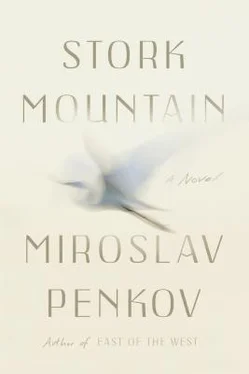Miroslav Penkov - Stork Mountain
Здесь есть возможность читать онлайн «Miroslav Penkov - Stork Mountain» весь текст электронной книги совершенно бесплатно (целиком полную версию без сокращений). В некоторых случаях можно слушать аудио, скачать через торрент в формате fb2 и присутствует краткое содержание. Год выпуска: 2016, Издательство: Farrar, Straus and Giroux, Жанр: Современная проза, на английском языке. Описание произведения, (предисловие) а так же отзывы посетителей доступны на портале библиотеки ЛибКат.
- Название:Stork Mountain
- Автор:
- Издательство:Farrar, Straus and Giroux
- Жанр:
- Год:2016
- ISBN:нет данных
- Рейтинг книги:4 / 5. Голосов: 1
-
Избранное:Добавить в избранное
- Отзывы:
-
Ваша оценка:
- 80
- 1
- 2
- 3
- 4
- 5
Stork Mountain: краткое содержание, описание и аннотация
Предлагаем к чтению аннотацию, описание, краткое содержание или предисловие (зависит от того, что написал сам автор книги «Stork Mountain»). Если вы не нашли необходимую информацию о книге — напишите в комментариях, мы постараемся отыскать её.
Stork Mountain — читать онлайн бесплатно полную книгу (весь текст) целиком
Ниже представлен текст книги, разбитый по страницам. Система сохранения места последней прочитанной страницы, позволяет с удобством читать онлайн бесплатно книгу «Stork Mountain», без необходимости каждый раз заново искать на чём Вы остановились. Поставьте закладку, и сможете в любой момент перейти на страницу, на которой закончили чтение.
Интервал:
Закладка:
The sun was setting that day and they were rushing to get back to their village before the dark fell. Such was the custom. They had sent the scout ahead to make sure their passage was clear, but what good was he in their hurry? And sure enough, just at a crossroad, they met another band of kalushari , young boys like them, from some other village, like them armed and stupid. What really happened, Grandpa couldn’t tell me exactly. Excitement overcame him. A great rush. One minute they were marching, quiet, the next they were throwing themselves at strangers, flinging daggers to slash them. Sure enough they slashed them. And they got slashed. When at last the commotion settled, when their blood cooled off a little, they sat down, the two bands together, to assess the damage. Only, one of the other band’s boys wasn’t moving, and when they looked closer — from his chest there stuck out a dagger. Someone whispered it was Grandpa’s cousin who’d killed him. Someone else said he’d seen Grandpa drive in the dagger. Was it him, was it his cousin, was it another boy — who could remember? And Grandpa’s head was splitting and his stomach was turning. So he retched in the bushes and his cousin followed. “If we return to the village,” he said, “they’ll hang us. For brigands like us, there is only one place now.” And they ran through the bushes and up into the woods and they joined the Communist fighters.
After this Grandpa was quiet. The bells had stopped ringing, and he was at rest in their silence. But I wasn’t; not after he’d gone back to his room, not after I’d seen dawn over the mountains. Why was my grandfather so stubborn, so reluctant to get involved with the nestinari again? If he recognized the whole thing as nothing but a charade, why not play along and help Aysha?
The imam sang for prayer and my thoughts swerved in a sleepless eddy. Forget the ringing bells, I muttered. Grandpa had tried to tell me something else with his story: don’t bloody your hands with superstition, stay away from the madness. I tossed, turned, hid under the blanket. If I helped Elif find the nestinari , I was betraying Grandpa. But I was also helping Aysha. And if I helped Aysha, wouldn’t Elif love me? Who in Klisura, other than Grandpa, knew how to cook a stew for witches?
SEVEN
IF MY KNUCKLES MADE ANY NOISE rapping on that door, I couldn’t hear it. Nor could I hear my own heart pounding, the wind gusting, and all through Klisura the broken window frames of empty houses knocking like lids of coffins, opening and closing shut. What I heard was these noises together in one big, messy loudness that grew messier, louder. One moment the moon shone and anyone could have seen me — slouched like a thief at the threshold — the next the sky was thick clouds and the world nothing but loudness.
“Open up, neighbors. It’s the teacher’s boy. The American.”
Was it footsteps I heard on the other side or a voice calling? I couldn’t be certain. So I knocked harder and then the door opened and Dyado Dacho stood before me.
“Good evening, Dyado,” I greeted. “I’ve come to see Baba Mina.”
All day before this I had been restless. And Grandpa had taken notice.
“I don’t know what you’re up to,” he’d told me at dinner, “but I’ll tell you this much: don’t do it. Not for your own sake, but for Elif and Aysha’s. When someone tells you his dog bites, you listen. You don’t lend the dog your throat to see how deep its teeth can sink in. So now I tell you — don’t test how deep the imam can bite us.”
After dinner, I washed the dishes and waited for Grandpa to finish his smoke, say goodnight, and retreat to his room. Then I climbed out my window, thumped into the cassis bush underneath it like a sack of crab apples, and limped across the yard, down the road, and to our neighbors’.
“It’s me, Grandpa, the American boy,” I told Dyado Dacho now from the threshold, and he raised the oil lamp to see me better. The light flickered, almost went out with the wind, and he pulled it back fearfully, as if he wouldn’t know how to relight the fire once he’d lost it.
“I’ve come alone,” I told him. “Grandpa went to bed already.”
I almost saw his mustache droop in disappointment, and for a moment I thought he’d shoo me away. But he coughed up a Come in now, hurry! with the rasp of someone who hadn’t spoken in many hours, and slammed the door shut behind me.
The noise of the world shattered into its component parts. I could hear distinctly the grains of sand from the road knocking outside like knuckles, Dyado Dacho’s stuffed nose whistling, and my heart beating right in my ears.
“Goes to bed with the chickens and hides like a chicken,” Dyado Dacho said of Grandpa, and led me down a narrow hallway. “Maybe he’ll start laying eggs soon. But I’d hide too if I played backgammon as lousy as he plays it. If I lost all my bets and never paid up.”
“Does he owe you money?” I managed, following closely. The old man barked, coughed, laughed — whatever that noise he made was really.
“I don’t rightly remember. But don’t you dare tell him!”
The corridor seemed to grow narrower, the planks at our feet louder in their creaking. The deeper into the house we waded, the more the smells of naphthalene and mold thickened. The mold, I’d come to realize on a previous visit, was from the house, its own smell; the naphthalene was from Dyado Dacho. In every pocket of his wool jacket he kept a mothball and he bragged boldly that he hadn’t seen a moth in thirty years. “Not since the devils ate up my best suit,” he’d told me. His only suit. The one in which he’d gotten married. The one in which, he’d hoped, one day he would be buried. “Some people declare war on world famine,” he’d told me on one occasion, “but I can’t be that noble. I’ve declared war on the moth devils. And I aim to win it.”
The room we entered was so hot, so stuffy the heat rushed at me like a bird fleeing its broken cage. A hefty fire burned in the fireplace and stretched Baba Mina’s shadow gigantic against one wall. But she was a tiny thing in her chair, close by the fire, and she did not turn to see who it was that had entered. She was mumbling under her breath — words I had no chance of catching — and metal knocked on metal so crisply that for a moment I thought it was two knives she sharpened.
“She’s been knitting for a week without stopping,” Dyado Dacho said, and went to adjust the blanket — perfectly preserved from the moth devils — that covered her shoulders. “It keeps her busy.”
Then he called her. “Grandma, the teacher’s boy has come to see you.” But the needles clattered so ferociously now, they overpowered even her mumble.
“Grandma,” I said, and stepped closer. It was then that she looked up — her face flushed, but not a single droplet of sweat glistening in the light of the fire and her eyes shiny like a fox’s.
“Ah, the teacher’s boy.” She smiled kindly. “The American.”
I sat in the chair across from her, a chair Dyado Dacho offered before limping to his spot in the corner, farthest away from the heat of the fire. He took a sweater out of a sack at his feet and began to unravel it, pulling the strand from one sleeve and piling up the yarn in his lap.
“What are you knitting, Grandma?” I asked, for her needles had gone back to clicking.
“It doesn’t matter,” she told me. “When I’m done Dyado Dacho unknits it. Ah, my boy, I wish I too were a sweater. I wish God could reknit me young as I was back in those days.”
Half my face was on fire and the other was catching it and sweat ran into my eyes and hurt them.
“Listen, Grandma, I’ve come to ask you about the nestinari .”
Читать дальшеИнтервал:
Закладка:
Похожие книги на «Stork Mountain»
Представляем Вашему вниманию похожие книги на «Stork Mountain» списком для выбора. Мы отобрали схожую по названию и смыслу литературу в надежде предоставить читателям больше вариантов отыскать новые, интересные, ещё непрочитанные произведения.
Обсуждение, отзывы о книге «Stork Mountain» и просто собственные мнения читателей. Оставьте ваши комментарии, напишите, что Вы думаете о произведении, его смысле или главных героях. Укажите что конкретно понравилось, а что нет, и почему Вы так считаете.











